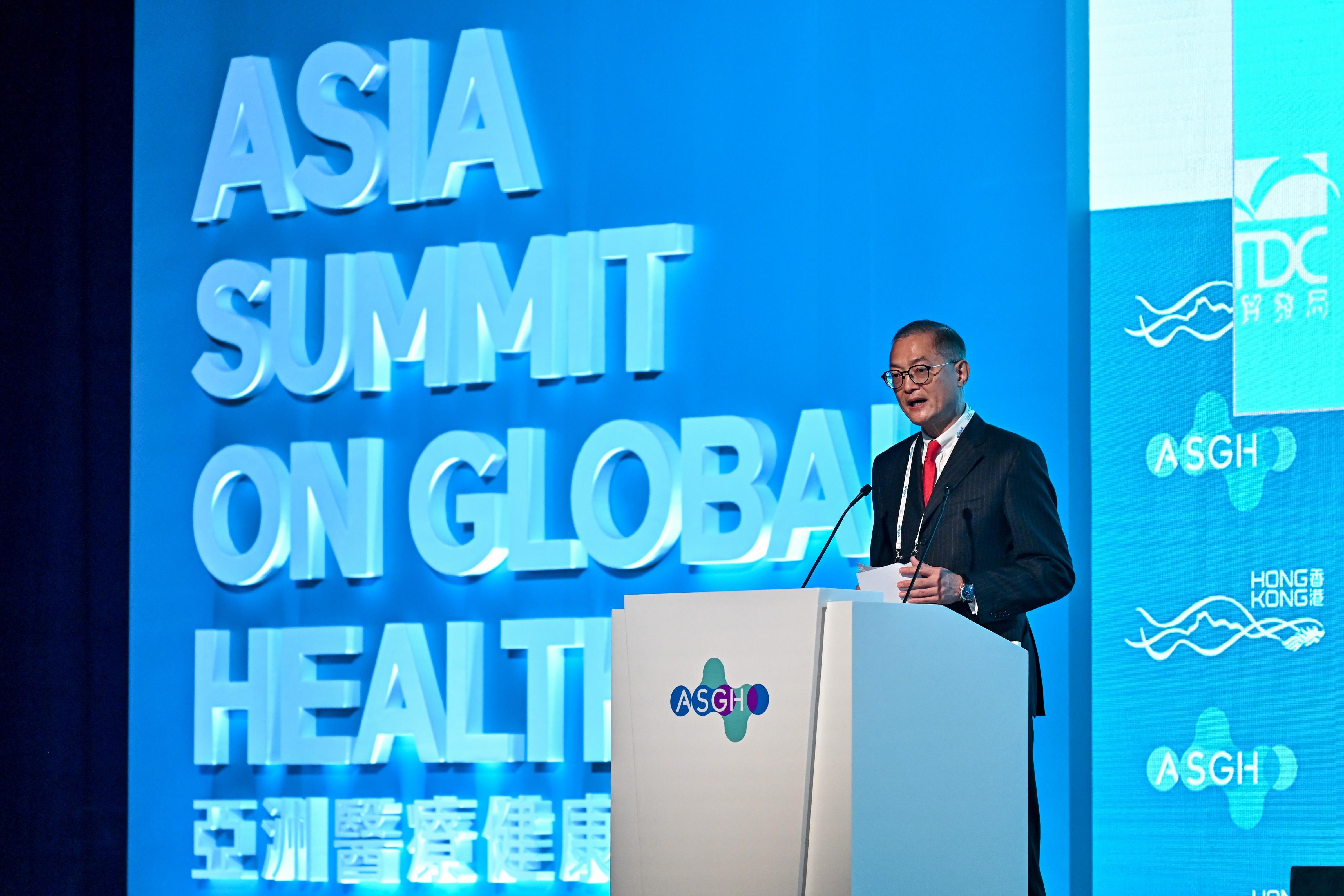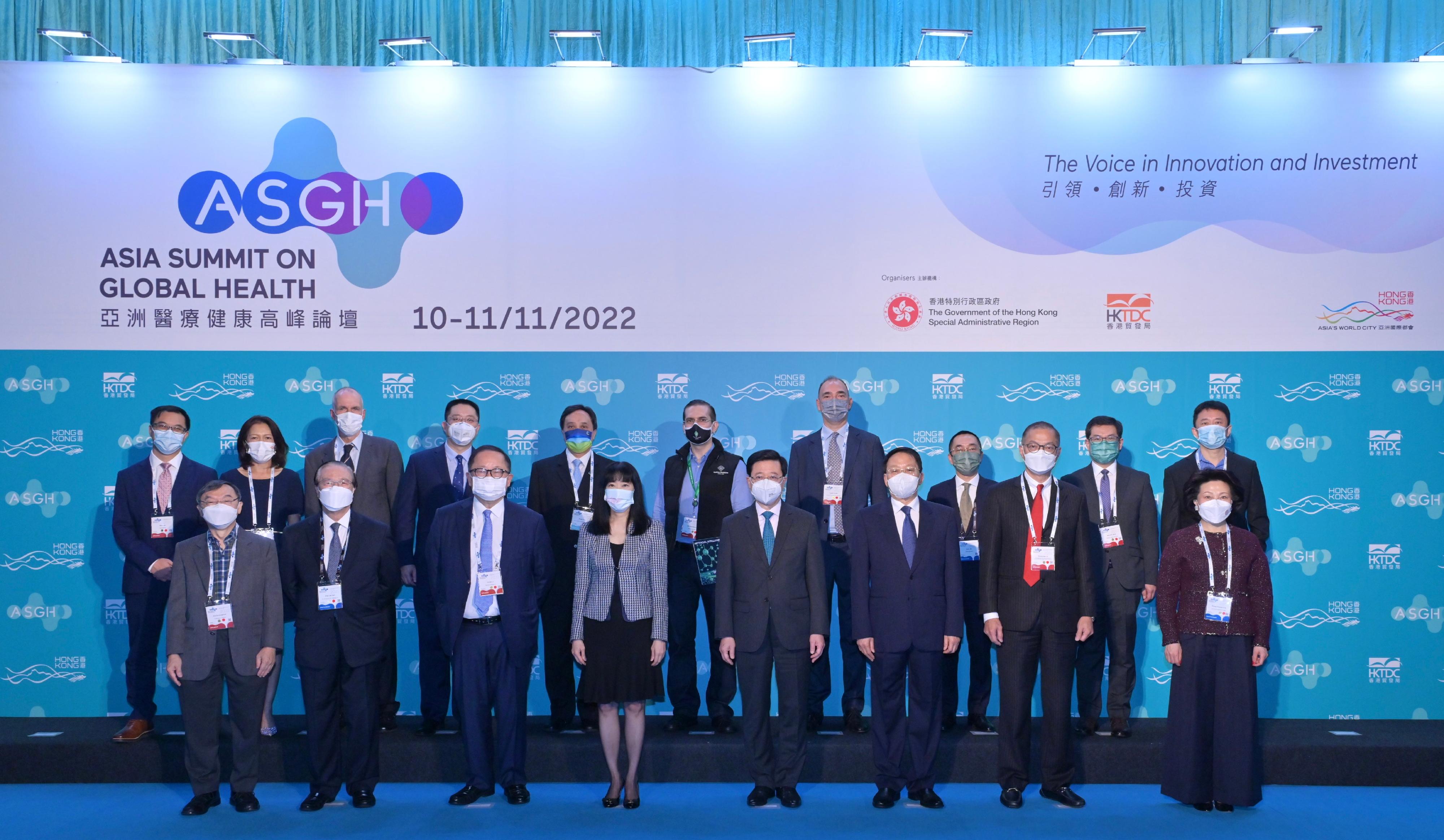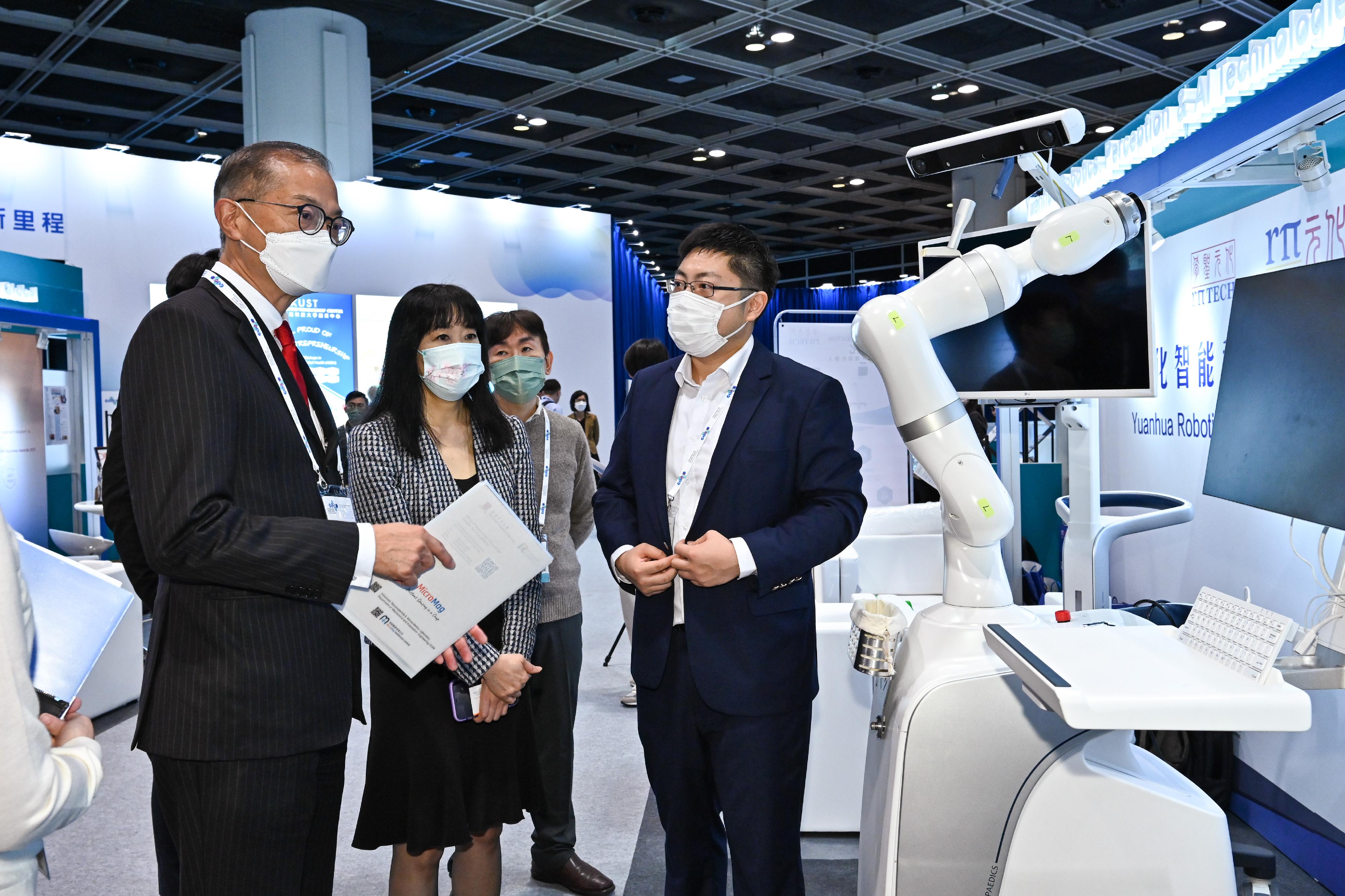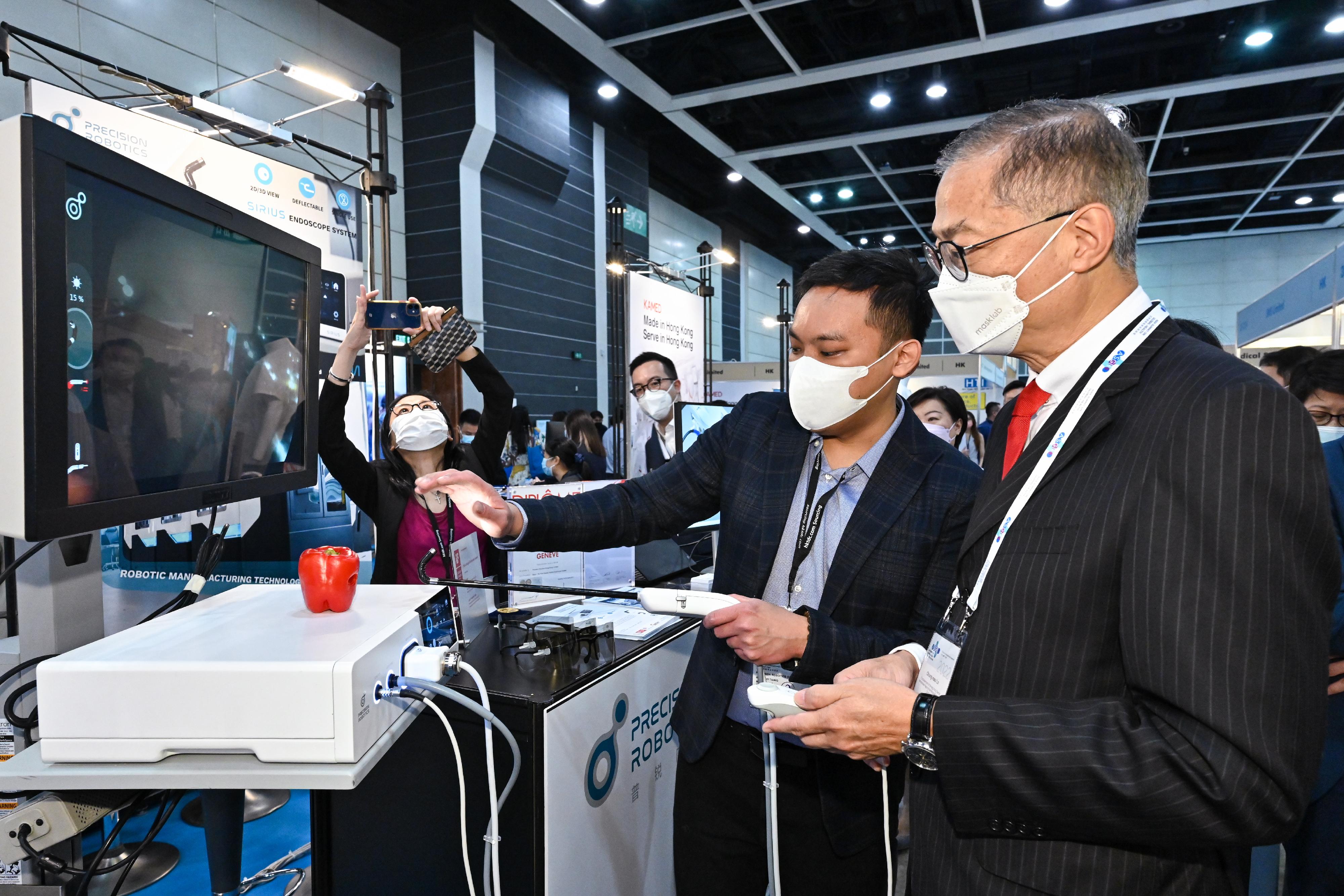Speech by S for Health at Panel Discussion: The Next Development of China's Healthcare Sector of Asia Summit on Global Health (English only) (with photos)
******************************************************************************************
Dr Donald Li (Chair of Panel Discussion and Chairman of the Elderly Commission), distinguished speakers, ladies and gentlemen,
Good morning. It is a great pleasure for me to welcome all of you, in person and online, to the second Asia Summit on Global Health. I am sure you all feel excited after the fruitful opening session and the networking break.
Development of Mainland's Healthcare System
This panel discussion focuses on "The Next Development of China's Healthcare Sector". As some of you may know, I served as the Hospital Chief Executive of the University of Hong Kong-Shenzhen (HKU-SZ) Hospital for almost six years before being appointed as the Secretary for Health of the Hong Kong Special Administrative Region (HKSAR) Government. This experience in Shenzhen granted me a front-row seat to witness the rapid and successful reform and development of our country's healthcare system.
"People First, Life First". The Central Government has always put the people's health at the top of its policy agenda, making universal health a primary goal of development. Indeed, China has made remarkable achievements in health reform in the past few decades. Since the 1950s, China has made great efforts to address people's growing demand for medical care, and gradually established a medical and health service system from the provincial to the village level. Since the latest reform of the health system was implemented in 2009, a basic medicine system has been gradually established nationwide, and basic public health services are provided for free throughout the country. With a comprehensive urban and rural resident medical insurance system covering the majority of its 1.4 billion population, China has built the world's largest medical insurance system.
In 2016, the Central Government released the Healthy China 2030 blueprint, which covers areas such as public health services, environment management, medical industry and drug safety. While acknowledging our country's health achievements so far, the blueprint noted that industrialisation, urbanisation, an ageing population, as well as environmental and lifestyle changes have created new challenges, and state-level strategies are needed to address these issues.
Development of the Greater Bay Area
Hong Kong has high-quality medical services, a highly efficient healthcare system and excellent life and health research. The HKSAR Government will continue to leverage Hong Kong's advantages and promote healthcare innovation and co-operation in the Guangdong-Hong Kong-Macao Greater Bay Area.
The development of the Greater Bay Area is a national strategy personally devised, planned and driven by President Xi Jinping. It is a key development strategy in the country's reform and opening up in the new era, as well as a further step in enriching the practice of "one country, two systems". The objectives of the development of the Greater Bay Area are to further deepen co-operation amongst Guangdong, Hong Kong and Macao, to fully leverage the composite advantages of the three places and to facilitate in-depth integration, with a view to developing an international first-class bay area ideal for living, working and travelling.
In the development of healthcare services, the HKSAR Government has been following the principles of complementarity and mutual benefits to enhance the co-operation with various cities of the Greater Bay Area, on the premise that both Hong Kong and the Mainland's healthcare system will benefit.
Flow of Talent
Take the flow of medical talent as an example, since the signing of the Mainland and Hong Kong Closer Economic Partnership Arrangement (CEPA) in 2003, the Central Government has provided a platform for Hong Kong healthcare professionals to establish their footprint in the Mainland. At present, 12 types of statutory registered healthcare professionals in Hong Kong (including Western and Chinese medical practitioners, dentists, pharmacists and nurses) can register for short-term practices in the Mainland and are not required to sit the Mainland's qualification examination.
For the first time in August 2021, the Shenzhen Municipal Government bestowed the title of Chief Physician to 37 doctors from Hong Kong, including me. Such a professional title is an important representation of the academic and clinical competence and expertise of healthcare professionals. It marked the first time that Shenzhen directly awarded such a senior title to Hong Kong doctors working in the city, which further facilitates the mutual recognition of medical professionals in the area. In 2019, the Hong Kong Academy of Medicine in collaboration with Shenzhen health commission established the SZ-HK Medical Specialist Training Centre at HKU-SZ Hospital. The HKSAR Government will continue to encourage healthcare professional bodies in Hong Kong to actively seek opportunities for leading the development and training of healthcare professionals in the Greater Bay Area.
Access of Drugs and Medical Devices
Meanwhile, to promote the innovation and development of the regulation of drugs and medical devices, the Central Government promulgated the Work Plan for Regulatory Innovation and Development of Pharmaceutical and Medical Device in the Greater Bay Area in 2020. This Work Plan allows designated healthcare institutions in the Mainland cities of the Greater Bay Area to use eligible drugs and medical devices registered and used in Hong Kong.
A trial was conducted at the HKU-SZ Hospital while I was serving as the Hospital Chief Executive. Following the successful completion of this trial, a total of 20 drugs and 13 medical devices are now allowed to be used. The work plan has been extended to five hospitals, with Hong Kong management background, in Shenzhen, Guangzhou, Zhuhai and Zhongshan. To foster closer medical co-operation between Hong Kong and the Mainland, the Chief Executive announced in the 2022 Policy Address that Hong Kong will make reference to the registration approvals made by the National Medical Products Administration, allowing pharmaceutical products registered in the Mainland to be registered and sold here upon fulfilment of the relevant requirements on safety, efficacy and quality. We will also maintain liaison with the Mainland on allowing more Hong Kong-registered drugs and medical devices to be used in the Greater Bay Area.
Meeting the Medical Needs of Hong Kong Citizens Residing in the Greater Bay Area
We are also mindful of the medical needs of Hong Kong citizens residing in the Greater Bay Area, especially during the COVID-19 pandemic. Following the success of the use of Elderly Health Care Voucher at HKU-SZ Hospital, the HKSAR Government launched the special support scheme in November 2020, under which the HKU-SZ Hospital has been commissioned to provide subsidised follow-up consultations for cross-border chronic disease patients who cannot return to Hong Kong for scheduled appointments at our public hospitals or clinics in Hong Kong. To ensure the quality of care, we assisted them in passing their medical records stored on our electronic health record system to the HKU-SZ Hospital for use during the consultations. Over 45 000 "cross-border" medical consultations have been made under this special support scheme - a breakthrough in cross-border healthcare service collaboration and integration.
Medical Insurance
As for medical insurance, the Central Government has implemented the Interim Measures for Hong Kong, Macao, and Taiwan Residents to Participate in Social Insurance Scheme in the Mainland since 2020. Hong Kong residents who are employed in the Mainland, as well as non-employed Hong Kong residents and university students living in the Mainland, may be included in the scope of the national social insurance scheme, and enjoy the same treatment accorded to Mainland residents. In this connection, the 2022 Policy Address announced that the HKSAR Government will study the feasibility of allowing Hong Kong people living in the Mainland cities of the Greater Bay Area to make use of our Elderly Health Care Vouchers for settling payments of Mainland medical insurance premiums, apart from paying for the fees of outpatient services provided by the HKU-SZ Hospital under the established mechanism.
Primary Healthcare
Taking this opportunity, I wish to highlight our plan for healthcare reform in Hong Kong by enhancing primary healthcare as announced in the 2022 Policy Address. Prevention is better than cure. In light of an ageing population and increasing prevalence of chronic diseases, we see an imminent need for change. Our aim is to shift the emphasis of the healthcare system from treatment-oriented, hospital-based to prevention-focused, community-based, by investing additional resources to promote primary healthcare.
To this end, the HKSAR Government will shortly publish the Primary Healthcare Blueprint. With District Health Centres as the hub, we will partner with the private healthcare sector to promote the concept of "family doctor for all".
We are going to establish the Primary Healthcare Authority for co-ordination and governance. It will also be responsible for setting standards and devising quality assurance. The major element of the re-organised healthcare system would include launching a three-year Chronic Disease Co-Care Pilot Scheme for hypertension or diabetes mellitus screening and management, enhancing the Elderly Health Care Voucher Scheme by extending subsidy for primary healthcare services, and direct access to services provided by physiotherapists and occupational therapists.
Closing
Ladies and gentlemen, let me conclude with a statement on the mission of the HKSAR Government: We will jointly build a Healthy Hong Kong in line with the national Healthy China initiative, with a view to making greater contribution to the integration of the Greater Bay Area as well as the overall healthcare development of the country. The Asia Summit on Global Health will facilitate opportunities for global participation in this.
I want to express my thanks to the Hong Kong Trade Development Council for pulling together this important Summit with the HKSAR Government. I wish you all a very rewarding Summit and good health. Thank you very much.
Ends/Thursday, November 10, 2022
Issued at HKT 15:45
Issued at HKT 15:45
NNNN






